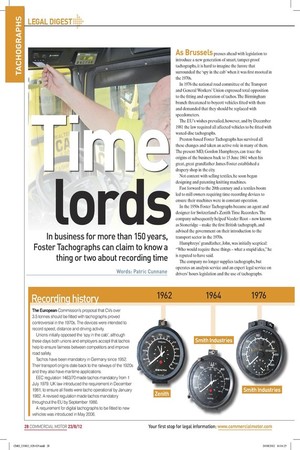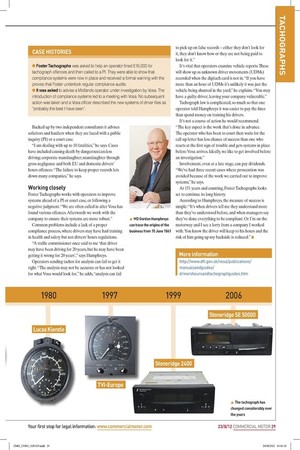ords
Page 19

Page 20

If you've noticed an error in this article please click here to report it so we can fix it.
In business for more than 150 years, Foster Tachographs can claim to know a thing or two about recording time
Words: Patric Cunnane As Brussels presses ahead with legislation to introduce a new generation of smart, tamper-proof tachographs, it is hard to imagine the furore that surrounded the ‘spy in the cab’ when it was first mooted in the 1970s.
In 1976 the national road committee of the Transport and General Workers’ Union expressed total opposition to the fitting and operation of tachos. The Birmingham branch threatened to boycott vehicles fitted with them and demanded that they should be replaced with speedometers.
The EU’s wishes prevailed, however, and by December 1981 the law required all affected vehicles to be fitted with waxed-disc tachographs.
Preston-based Foster Tachographs has survived all these changes and taken an active role in many of them. The present MD, Gordon Humphreys, can trace the origins of the business back to 15 June 1861 when his great, great grandfather James Foster established a drapery shop in the city.
Not content with selling textiles, he soon began designing and patenting knitting machines.
Fast forward to the 20th century and a textiles boom led to mill owners requiring time-recording devices to ensure their machines were in constant operation.
In the 1950s Foster Tachographs became an agent and designer for Switzerland’s Zenith Time Recorders. The company subsequently helped Veeder Root – now known as Stoneridge – make the first British tachograph, and advised the government on their introduction to the transport sector in the 1970s.
Humphreys’ grandfather, John, was initially sceptical: “Who would require these things – what a stupid idea,” he is reputed to have said.
The company no longer supplies tachographs, but operates an analysis service and an expert legal service on drivers’ hours legislation and the use of tachographs. Backed up by two independent consultants it advises solicitors and hauliers when they are faced with a public inquiry (PI) or a court case.
“I am dealing with up to 10 fatalities,” he says. Cases have included causing death by dangerous/careless driving; corporate manslaughter; manslaughter through gross negligence and both EU and domestic drivers’ hours offences. “The failure to keep proper records lets down many companies,” he says.
Working closely
Foster Tachographs works with operators to improve systems ahead of a PI or court case, or following a negative judgment. “We are often called in after Vosa has found various offences. Afterwards we work with the company to ensure their systems are more robust.” Common problems include a lack of a proper compliance process, where drivers may have had training in health and safety but not drivers’ hours regulations.
“A traffic commissioner once said to me ‘that driver may have been driving for 20 years, but he may have been getting it wrong for 20 years’ , ” says Humphreys.
Operators sending tachos for analysis can fail to get it right. “The analysis may not be accurate or has not looked for what Vosa would look for,” he adds, “analysis can fail to pick up on false records – either they don’t look for it, they don’t know how or they are not being paid to look for it.” It’s vital that operators examine vehicle reports. These will show up as unknown driver movements (UDMs) recorded when the digitach card is not in. “If you have more than an hour of UDMs it’s unlikely it was just the vehicle being shunted in the yard,” he explains. “You may have a guilty driver, leaving your company vulnerable.” Tachograph law is complicated, so much so that one operator told Humphreys it was easier to pay the fines than spend money on training his drivers.
It’s not a course of action he would recommend. “The key aspect is the work that’s done in advance. The operator who has been to court then waits for the call-up letter has less chance of success than one who reacts at the first sign of trouble and gets systems in place before Vosa arrives. Ideally, we like to get involved before an investigation.” Involvement, even at a late stage, can pay dividends. “We’ve had three recent cases where prosecution was avoided because of the work we carried out to improve systems,” he says.
At 151 years and counting, Foster Tachographs looks set to continue its long history.
According to Humphreys, the measure of success is simple: “It’s when drivers tell me they understand more than they’ve understood before, and when managers say they’ve done everything to be compliant. Or I’m on the motorway and I see a lorry from a company I worked with. You know the driver will keep to his hours and the risk of him going up my backside is reduced.” ■
Recording history
The European Commission’s proposal that CVs over 3.5 tonnes should be fitted with tachographs proved controversial in the 1970s. The devices were intended to record speed, distance and driving activity.
Unions initially opposed the ‘spy in the cab’, although these days both unions and employers accept that tachos help to ensure fairness between competitors and improve road safety.
Tachos have been mandatory in Germany since 1952. Their transport origins date back to the railways of the 1920s and they also have maritime applications.
EEC regulation 1463/70 made tachos mandatory from 1 July 1979. UK law introduced the requirement in December 1981, to ensure all fleets were tacho operational by January 1982. A revised regulation made tachos mandatory throughout the EU by September 1986.
A requirement for digital tachographs to be fitted to new vehicles was introduced in May 2006.
CASE HISTORIES
• Foster Tachographs was asked to help an operator fined £15,000 for tachograph offences and then called to a PI. They were able to show that compliance systems were now in place and received a formal warning with the proviso that Foster undertook regular compliance audits.
• It was asked to advise a Midlands operator under investigation by Vosa. The introduction of compliance systems led to a meeting with Vosa. No subsequent action was taken and a Vosa officer described the new systems of driver files as “probably the best I have seen”.
More information
http://www.dft.gov.uk/vosa/publications/ manualsandguides/ drivershoursandtachographguides.htm








































